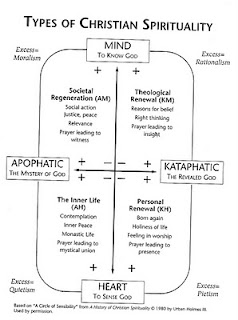Church seeks spirituality of youth . . . and doesn't like what it finds
Someone at college sent me a link to this article
Ruth Gledhill writes
In an era when more people than ever know so little about the story of the Christian faith it can not be assumed that people have an adequate framework with which to interpret the gospel message. They point to a process of being playful; through story; in an understated manner and through dialogue.
Ruth Gledhill writes
THE Church of England has debunked the widely held view that young people are spiritual seekers on a journey to find transcendent truths to fill the “God-shaped hole” within them....If they think about church at all, the images young people come up with are “cardigans”, “sandals and socks”, “corrupt”, “traditionalist” and “stagnant”.read more here; and here
In an era when more people than ever know so little about the story of the Christian faith it can not be assumed that people have an adequate framework with which to interpret the gospel message.
I'm piecing the infomation together and it seems that the report is written by the same team that wrote Ambiguous Evangelism (Mayo, B., Savage, S. and Collins, S (2004) Ambiguous Evangelism. SPCK) in which they put together a compelling argument that contemporary evangelism has to recognise that the bulk of society are increasingly opinion tolerant and what they term ‘pre non-Christian’.In an era when more people than ever know so little about the story of the Christian faith it can not be assumed that people have an adequate framework with which to interpret the gospel message. They point to a process of being playful; through story; in an understated manner and through dialogue.
- Playfully because appealing to someone's imagination can be stronger than appealing to their intellect - initially, people will generally respond more to passion and feeling than to clarity and understanding.
- Through story because the narrative forms an easy way for people to appropriate ideas and thoughts into their own context.
- In an understated manner, where appropriate, in order to encourage people to come back and ask questions.
- Through encouraging a dialogue and exchange of ideas with the other person, because belief is not a subject that can be dealt with in one single conversation or presentation.

Comments
I guess the answer lies somewhere in taking the opportunities of a greater willingness to discuss the 'spiritual' to talk about issues of faith/belief (in a non-confrontational manner!).
M